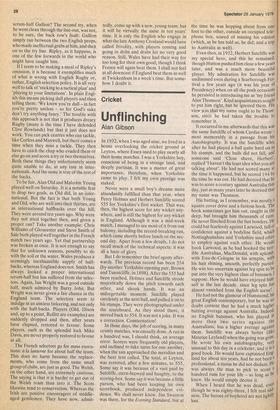Cricket
Unflinching
Alan Gibson
In 1932, when I was aged nine, we lived in a house overlooking the cricket ground at Leyton, where' Essex used to play nearly all their home matches. I was a Yorkshire boy, conscious of being in a strange land, and deeply partisan. It was a matter of great importance, therefore, when Yorkshire came to play. I felt my own prestige was staked.
Never were a small boy's dreams more abundantly fulfilled than that year, when Percy Holmes and Herbert Sutcliffe scored 555 for Yorkshire's first wicket. That was, then, the highest score for any wicket anywhere, and is still the highest for any wicket in England. Although it was a mid-week match, I managed to see most of it from our balcony, including the record-breaking run, which came shortly before lunch on the second day. Apart from a few details, I do not recall much of the technical aspects: it was all a haze of glory.
But I do remember the brief agony afterwards. The previous record has been 554 (by another Yorkshire opening pair, Brown and Tunnicliffe, in 1898). After the 555 had been reached, Holmes and Sutcliffe strode majestically down the pitch towards each other, and shook hands. It was an unforgettable moment. Sutcliffe played carelessly at the next ball, and pulled it on to his stumps. They were photographed under the scoreboard. As they stood there, it moved back to 554. It was not a joke. It was a correction. Consternation!
In those days, the job of scoring, in many county matches, was casually done. A run in a hundred was, I should think, an average error. Scorers were frequently old players, and inclined to take turns for one another, when the sun approached the meridian and the beer tent called. The total, at Leyton, was restored, after a few minutes, to 555. Some say it was because of a visit paid by Sutcliffe, stern-browed and haughty, to the scoring-box. Some say it was because a little parson, who had been keeping his own scorebook, produced independent evidence. We shall never know. Jim Swanton was there, for the Evening Standard, but at the time he was hopping about from one foot to the other, outside an occupied telephone box, scared of missing his edition (which, as he has told us, he did; and a trip to Australia as well).
Even then, in 1932, Herbert Sutcliffe was my special hero, and this he remained; though Hutton pushed him close a few years later, and was a much more beautiful player. My admiration for Sutcliffe was undimmed even during a Scarborough Festival a few years ago (it was his year of Presidency) when on all the posh occasions he persisted in introducing me as 'my friend Alan Thomson'. Kind acquaintances sought to put him right, but he ignored them. HIS view was that my name ought to be Thomson, since he had taken the trouble to remember it.
It occurred to me afterwards that this was the same Sutcliffe of whom Cardus wrote most memorably in a passage from his Autobiography. It was the Sutcliffe who, after he had played a ball quite hard on to his stumps, and the bails did not fall, and someone said 'Close shave, Herbert', replied 'I haven't the least idea what you are talking about'. He had not scored many at the time it happened, but he scored 194 by the time he was out. He had decreed that he was to score a century against Australia that day, just as many years later he decreed that my name was Thomson.
His batting, as I remember, was mostly 0 square cover drive and a furious hook. The hook sometimes got him out, caught in the deep, but brought him thousands of runs. He never flinched from the fast bowlers. He could bat fearlessly against Larwood, full of confidence against a bodyline field, which Nottinghamshire and Yorkshire used often to employ against each other. He would hook Larwood, as he had hooked the tar' ible Australian, MacDonald, with aplomb, with Eau-de-Cologne in his armpits, with his hair shining, smooth, perfectly parted. He was too uncertain against leg spin to be put into the very highest class of batsmen, I suppose. How he would have enjoyed hint' self in the last decade, since leg spin has almost vanished from the English scene!, He had not the glamour of Hammond, 1115 great English contemporary, but he was no
doubt content that he had a much higher
batting average against Australia. Indeed, no English batsman, who has played la more than two series against the Australians, has a higher average against them. Sutcliffe was always better (like
Maurice Leyland) when the going was grim. He wrote his own autobiography, verY unusual to this day in a cricketer, and it is ° good book. He would have captained Eng'
land for about ten years, had he not been ° professional, a status he did not disdain. Fie
was always the man to pick to score a hundred runs for your life — so long as he knew. He would simply decree it.
When I heard that he was dead, eve° though he was eighty-three, I felt real sad" ness. The heroes of boyhood are not lighrlY lost.


































 Previous page
Previous page